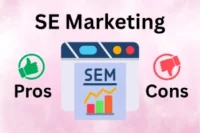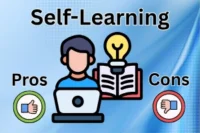Pros & Cons of Search Engine Optimization (SEO)
Published: 21 Aug 2025
SEO, search engine optimization, SEO optimization, Optimizing for search engines, etc. I am pretty sure that you have usually heard of these terms often. And you’re struggling in this world, too, which is why you came to my article to discover all the pros and cons of SEO.
So, guys, worry not. This article will explore the Advantages and Disadvantages of SEO (Search Engine Optimization, or SEO) in depth.
Search Engine Optimization Advantages
Okay, let’s now explore the promising aspects of SEO in the article named “Benefits of SEO”. What are the advantages of SEO, how can it elevate your site’s performance, and how can it secure a top position in the SERPs?

Here’s a detailed look at all the search pros:
- Organic Traffic Gain
- Higher Ranking on SERPs
- Targeted Audience Reach
- Local Visibility Boost
- Long-Term Traffic Growth
- Brand Authority Buildup
- Competitor Outranking
- Reduced Ad Dependence
- Enhanced Usability & Navigation
- Faster Loading Speed
- Mobile-friendliness Improvement
- User Engagement Rise
- Higher Conversion Rates
- Customer Satisfaction Increase
- Trust & Credibility Build
- Improved Website Crawlability & Indexability
- Enhanced Website Structure & Internal Linking
- Optimized Page Speed & Responsiveness
- Secure Website & HTTPS Implementation
- Algorithm Update Adaptability
Let’s cover each SEO advantage in detail.
1. Organic Traffic Gain
Getting free traffic is the best thing about SEO. You don’t need to spend on ads all the time. Once your site starts ranking, people come naturally. This is why I always suggest focusing on long-term SEO.
- Brings free and continuous visitors
- Reduces reliance on paid ads
- Creates sustainable online growth
2. Higher Ranking on SERPs
When your website shows up on the first page, people trust you more. I know I usually click top results myself. Ranking higher means more visibility and more chances to get clicks.
- Improves visibility in search engines
- Builds credibility with users
- Increases chances of getting traffic
3. Targeted Audience Reach
SEO doesn’t just bring anyone, it brings the right people. If you sell shoes, SEO can connect you with shoe buyers. That’s why targeting the right keywords is so important.
- Reaches people who are already interested
- Attracts qualified leads
- Improves chances of conversions
4. Local Visibility Boost
For small businesses, local SEO is a game-changer. I’ve seen local shops get more foot traffic just by appearing on Google Maps. It’s the easiest way to connect with nearby customers.
- Shows up in local searches
- Helps customers find your business
- Boosts visits to physical stores
5. Long-Term Traffic Growth
Ads stop the moment you stop paying. But SEO keeps working for months and even years. I see it as planting a tree—it grows and keeps giving results.
- Provides steady website visitors
- Keeps working even after setup
- Supports long-term growth
6. Brand Authority Buildup
When people see your site ranking high, they start trusting you more. It’s like becoming an expert in your field without saying a word. That’s why authority matters.
- Positions your brand as reliable
- Builds long-term trust
- Increases customer confidence
7. Competitor Outranking
Outranking competitors feels like winning a race. If you don’t work on SEO, they will. That’s why I always recommend keeping an eye on competitor strategies.
- Captures audience from rivals
- Strengthens your market share
- Keeps you ahead of competition
8. Reduced Ad Dependence
Relying only on ads is risky and costly. SEO saves you from spending money every day. With SEO, your site can still attract traffic even if ads stop.
- Cuts down marketing costs
- Provides stable visitor flow
- Balances ads with organic reach
9. Enhanced Usability & Navigation
SEO isn’t just about Google—it also makes your site easier for people. I personally enjoy websites where everything is simple to find. Clean navigation keeps users happy.
- Improves user browsing experience
- Makes content easier to access
- Lowers bounce rate
10. Faster Loading Speed
Nobody likes slow websites. I often leave if a site takes too long to load. SEO pushes you to optimize speed, which is great for both users and rankings.
- Loads pages faster
- Increases user satisfaction
- Improves search performance
11. Mobile-friendliness Improvement
Most people today use their phones to browse the internet. If a site isn’t mobile-friendly, users leave quickly. I often feel frustrated when a website doesn’t fit my phone screen. SEO makes sure websites work smoothly on all devices. This improves both user experience and ranking.
- Optimizes site for mobile devices
- Ensures better design responsiveness
- Helps rank higher in mobile searches
12. User Engagement Rise
Engagement shows how much people interact with a website. SEO helps create better content that keeps visitors interested. I personally enjoy staying longer on sites that answer my questions clearly. A well-optimized site feels easy to use and trustworthy. This leads to more clicks and actions.
- Increases average time spent on site
- Boosts page views and interactions
- Builds stronger connections with visitors
13. Higher Conversion Rates
Getting traffic is one thing, but getting results is another. SEO brings people who are already looking for what you offer. I’ve seen businesses double their sales through smart SEO. Visitors are more likely to take action when the site is optimized. This makes SEO very cost-effective.
- Attracts visitors with buying intent
- Converts more leads into sales
- Improves ROI from digital marketing
14. Customer Satisfaction Increase
Satisfied customers are more likely to return. SEO helps create websites that are clear, fast, and easy to use. I love when I find answers quickly without too much effort. A good user experience builds trust in the brand. Happy customers often become loyal customers.
- Improves browsing experience
- Builds positive brand impression
- Encourages repeat visits
15. Trust & Credibility Build
People trust Google’s top results naturally. Being ranked high feels like a stamp of approval. I often believe top websites more than the rest. SEO slowly builds that credibility over time. This trust brings long-term success for businesses.
- Boosts brand reputation
- Makes business appear reliable
- Creates customer loyalty
16. Improved Website Crawlability & Indexability
Search engines need to read your site to rank it. If a site is hard to crawl, it may never show up. SEO makes websites more search-engine-friendly. I think of it like making your site “Google-readable”. This directly improves ranking chances.
- Helps Google bots understand site
- Improves indexing of pages
- Supports better ranking chances
17. Enhanced Website Structure & Internal Linking
A website should be easy to explore. SEO encourages good structure and smart internal links. I always enjoy websites that guide me smoothly from one page to another. This helps both users and search engines find important content. Better structure means better performance.
- Creates a logical site structure
- Helps visitors explore more pages
- Passes SEO value through internal links
18. Optimized Page Speed & Responsiveness
Nobody likes a slow website. I usually leave if a site takes too long to load. SEO pushes for faster speed and smoother performance. This makes browsing easier on all devices. A quick site keeps visitors happy and engaged.
- Improves loading performance
- Enhances responsiveness on all screens
- Reduces bounce rates
19. Secure Website & HTTPS Implementation
Security is a must for any online platform. People trust websites with HTTPS more than unsecured ones. I never share details on a site without the lock icon. SEO encourages businesses to secure their sites. This builds confidence and keeps users safe.
- Builds user trust with HTTPS
- Protects data during browsing
- Increases chances of better rankings
20. Algorithm Update Adaptability
Google updates its algorithms regularly. Some sites lose rankings overnight if they don’t adapt. SEO helps businesses stay prepared for changes. I’ve noticed that adaptive sites survive longer online. Staying updated ensures consistent performance.
- Keeps site compliant with updates
- Reduces ranking losses
- Ensures long-term online presence
Search Engine Optimization Disadvantages
So, guys, we have heard enough about the advantages of SEO, so why not mention the disadvantages of SEO as well?

After all, in what scenarios is SEO not good for our website, what are its disadvantages? So don’t worry; here I have listed all the SEO cons, so let’s read them:
- Time-Consuming
- Uncertain Results
- Competitive Nature
- Technical Expertise Needed
- Algorithm Changes
- Initial Investment
- Not Immediate Results
- Dependency on Search Engines
- Quality Content Requirement
- Risk of Penalties
Let’s dig in, starting with the first SEO drawback.
1. Time-Consuming
SEO takes a lot of patience and effort. You cannot expect results overnight. I’ve seen websites work for months before they notice improvements. This can be discouraging for beginners. If you want quick wins, SEO may feel too slow.
- Requires consistent long-term effort
- Demands regular updates and monitoring
- Results may take months to appear
2. Uncertain Results
Even if you work hard, there’s no 100% guarantee of success. SEO depends on search engine algorithms, which no one fully controls. I’ve seen great content still struggle to rank. This uncertainty can make it frustrating. Businesses may feel like they’re taking a gamble.
- Rankings are unpredictable
- Success not fully in your control
- Efforts may not always pay off
3. Competitive Nature
SEO is a battlefield, especially for popular keywords. Big brands with large budgets often dominate the top spots. I sometimes feel small websites don’t get a fair chance. Competing against established players is tough. This can make SEO feel discouraging for newcomers.
- High competition for top rankings
- Difficult for small sites to stand out
- Popular niches are hard to penetrate
4. Technical Expertise Needed
SEO is not just about writing content. It involves technical setups, coding fixes, and analytics. I know many people who struggle with these areas. Without proper knowledge, mistakes can harm performance. Sometimes, professional help becomes necessary.
- Requires knowledge of technical SEO
- Mistakes can harm rankings
- May need expert support
5. Algorithm Changes
Google changes its algorithms frequently. What works today may fail tomorrow. I’ve seen sites lose traffic overnight after an update. This makes SEO a never-ending learning process. You must stay updated constantly.
- Rankings can drop suddenly
- Requires continuous adaptation
- Increases workload and stress
6. Initial Investment
While SEO is cheaper than ads, it still requires investment. Tools, content creation, and experts cost money. I’ve seen businesses hesitate due to these costs. Without proper funding, progress can be slow. It’s not entirely free as many people believe.
- Costs for tools and services
- Content creation requires budget
- ROI takes time to show
7. Not Immediate Results
SEO is a long-term game, not a quick fix. I personally get impatient when results don’t show fast. It can take weeks or months to see growth. For urgent goals, this can be a big drawback. Some businesses need quicker returns.
- Delayed visibility and traffic
- Unsuitable for short-term campaigns
- Patience is a must
8. Dependency on Search Engines
Your business becomes dependent on Google and other engines. If your site drops in ranking, your traffic suffers instantly. I’ve seen companies panic after losing their top spot. This heavy reliance can be risky. Having only SEO as a strategy is dangerous.
- Over-dependence on search engines
- Rankings impact entire business
- Requires backup marketing strategies
9. Quality Content Requirement
SEO heavily depends on good content. Poor content simply won’t rank. I sometimes find this challenging because creating quality content takes time and effort. Without fresh and valuable posts, your site loses visibility. This makes content creation a never-ending task.
- Needs constant fresh content
- High-quality writing is a must
- Weak content struggles to rank
10. Risk of Penalties
Search engines have strict rules. If you break them, even by mistake, penalties can crush your site. I’ve seen websites vanish from rankings overnight. It can take months to recover. This is one of the biggest risks of SEO.
- Risk of Google penalties
- Hard recovery after violations
- Can destroy online visibility
Conclusion
So guys, this is the end of our article. So my dears, in this article, we have discussed the pros and cons of SEO in great detail. From SEO’s grateful advantages to its dangerous disadvantages.
However, I would like to say here that the benefits of SEO are greater, so please do SEO of your site and make your place on the first page of Google. Well, if you do not understand anything, you can ask me in the comment section.
FAQs
Here are some of the most frequently asked questions related to the advantages and disadvantages of SEO:
SEO (Search Engine Optimization) is used to improve a website’s visibility on search engines, making it more likely to be found by users searching for relevant information.
The major pros of SEO are:
- Increased Visibility
- Higher Website Traffic
- Better User Experience
- Credibility and Trust
- Cost-Effectiveness
The major SEO limitations are:
- Time-Consuming
- Results Aren’t Immediate
- Constant Changes in Algorithms
- Dependence on External Factors
- Requires Ongoing Effort and Monitoring
SEO may not be as effective if not implemented properly, if it lacks consistency, or if the website content is not relevant and high-quality. Additionally, for certain businesses or situations, other marketing strategies may be more suitable.
SEO Advantages:
- Increased visibility
- Higher traffic
- Improved user experience
SEO Disadvantages:
- Time-consuming
- Results take time
- Algorithm changes impact rankings

- Be Respectful
- Stay Relevant
- Stay Positive
- True Feedback
- Encourage Discussion
- Avoid Spamming
- No Fake News
- Don't Copy-Paste
- No Personal Attacks

- Be Respectful
- Stay Relevant
- Stay Positive
- True Feedback
- Encourage Discussion
- Avoid Spamming
- No Fake News
- Don't Copy-Paste
- No Personal Attacks





